9 Facts About Scotch Eggs You Should Know
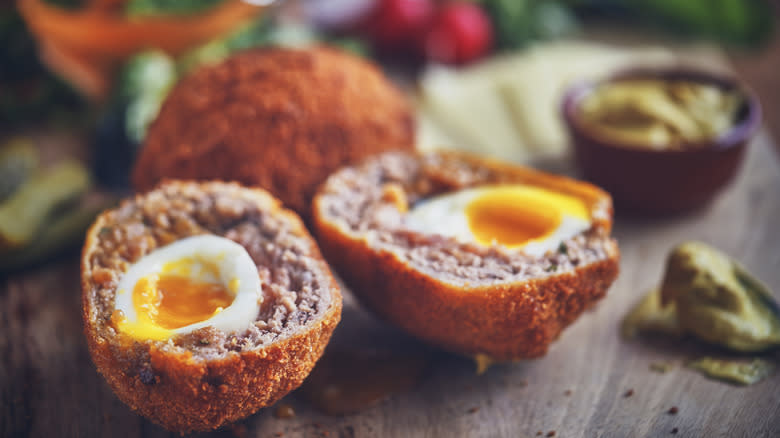
Scotch eggs are a popular British dish, made by coating a hard-boiled egg in sausage meat and breadcrumbs before frying it all to a perfect crisp. It's served hot in restaurants and pubs and is also commonly eaten cold on picnics or as leftovers. The Scotch egg is a unique and versatile dish that has withstood the test of time to become one of the most iconic British snacks. Over its lifetime, it has gathered plenty of admirers who have created a culture around the Scotch egg, with cooking contests and many regional variations to boot. Although you can fit it all in a single sentence, the process of cooking a Scotch egg is delicate and difficult to master.
Though the history of the Scotch egg isn't crystal clear, its impact and popularity in British cuisine are. For some reason, British cuisine often has a bad reputation -- but this deep-fried, sausage-coated, crispy treat is here to argue against that standing.
Read more: 30 Healthy Snack Ideas That Won't Ruin Your Diet
No One Can Agree On The History Of The Scotch Egg
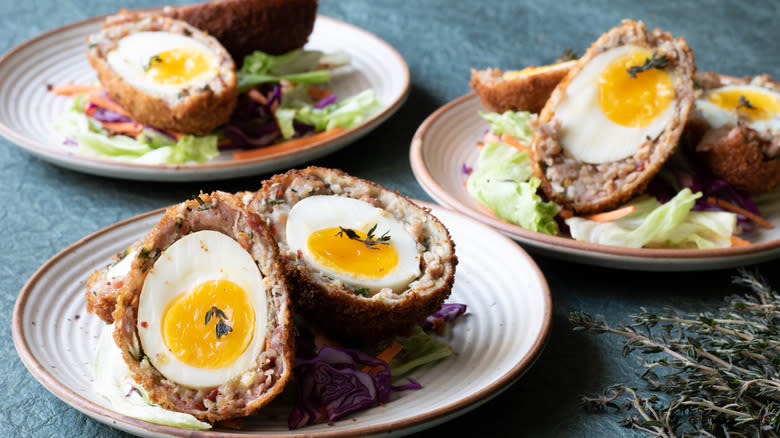
The true origin of the Scotch egg is shrouded in mystery. There doesn't exist a singular story that all Scotch egg enthusiasts and historians can agree on, and it may be that each tale holds its own kernel of the truth. Two of the prevailing stories, which to this day find themselves still in a stalemate, claim that the Scotch was an entirely British invention.
Fortnum's, a popular London department store that dates back to the early 1700s, claims to have been the inventor of the Scotch egg due to it being available in some advertisements found in its archive. The other claim comes from William J Scott & Sons (one possible point of origin for the term "Scotch"). This was a popular restaurant in the mid-1800s, though its Scotch egg was molded with a fish paste rather than the sausage that is found in the dish today. Fortnum's claim points to an earlier point in time than William's. William's recipe is different — but Fortnum has never backed up its claims with clear evidence.
In 1809, a book by Maria Rundell called "A New System of Domestic Cookery" published a recipe for the Scotch egg, though, of course, it's a little different than the one we know today. This means that the dish was probably established in the United Kingdom sometime in the late 1700s.
The Scotch Egg Is A Classic British Dish
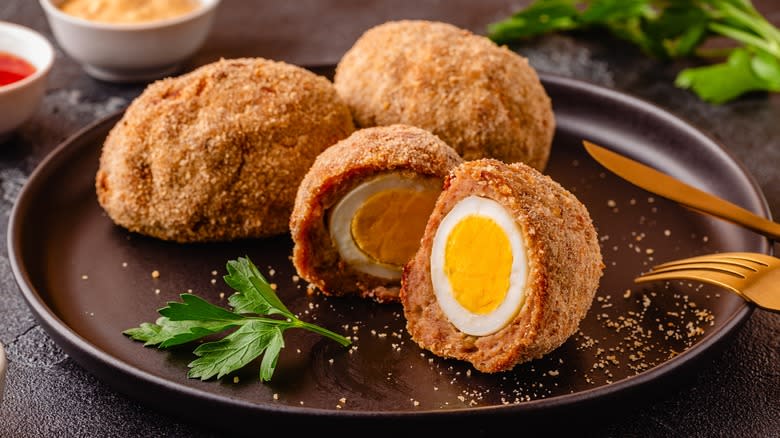
When you think of your favorite British foods, what comes to mind? Bangers and mash? Shepherd's pie? Fish and chips? Probably all of these and more — but the list wouldn't be complete without the Scotch egg. British culinary history is rich with tall tales and historical nexus points, from the world wars that created common dishes for the everyday person to the cultural exchanges made with England's neighbors and the countries they colonized. Not only does the Scotch egg have a long history in and around the United Kingdom, but it's also made with common British ingredients and methods.
Scotch eggs are most commonly found in British pubs (known in the past as public houses), which play a huge role in British culture and history. For a very long time, Scotch eggs were deemed to be an appetizer or a snack, but in 2020 British ministers found the dish to be "substantial," which changed some of the laws around when and where it can be served in the pandemic era. This caused a huge surge in Scotch egg demands and sales, bringing it back to the popularity it had in the past.
A poll taken in 2019 by YouGov showed that the Scotch egg was one of the least popular of the iconic British foods. Even so, that means that the Scotch egg is an iconic British food.
Scotched Doesn't Mean What You Think It Means
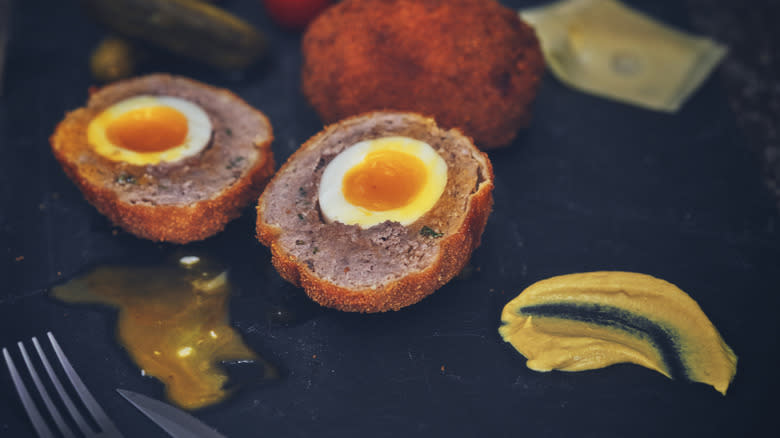
If you're anything like us, you thought the "Scotch" in Scotch egg meant that the dish hailed from Scotland. Though it isn't definitive, there does exist a theory that the name "Scotch" comes from a process of boiling eggs and covering them in a lime powder to preserve them. This became a necessity in the late 1800s when Scotland was exporting a lot of eggs to London, and that aforementioned process was dubbed "scotching." This comes after the inclusion of Scotch eggs in a few cookbooks from the early and middle 19th century, so it doesn't add up as an origin story.
Another common belief is that the term is related to "scorch," like butterscotch being made originally with scorched butter. The dish used to be cooked over an open flame — hence "scorched" — but again, this theory is inconclusive due to the most popular Scotch egg recipes being cooked with lard in a frying pan.
If all this isn't confusing enough, there are still a couple of other unrelated cooking processes known as "scotching," some hailing from Scotland, others not. So what does scotched mean? Do any of these theories have anything to do with the egg? Yes, and no. Because it is impossible to trace the exact origins of this dish, what's most likely is that each concept added its fingerprint to the dish we know today, some prints larger and more impactful than others.
Manchester Has Its Own Version Of The Scotch Egg
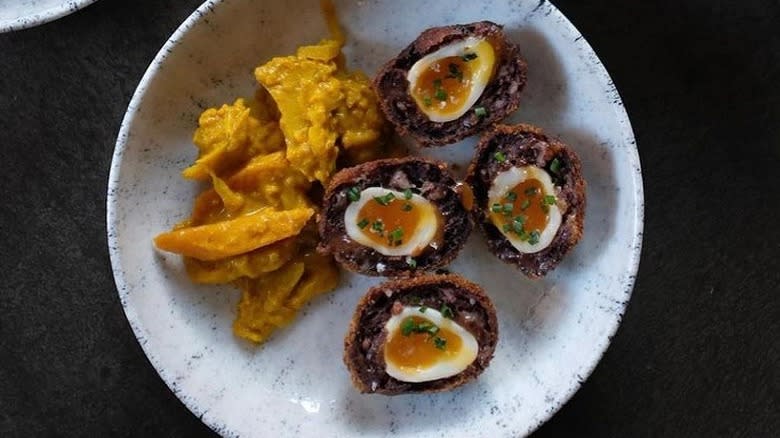
Like most traditional dishes, the exact recipe of the Scotch egg has changed over time, absorbing some developments into its DNA while pruning others. One such variation of the Scotch egg has taken on a life of its own.
A man named Ben Holden was enjoying a meal at one of his favorite pubs in Manchester, having ordered a Scotch egg, some chips, and a pickled egg. Out of idle curiosity, he began to mix the pickled egg with the chips and Scotch egg, trying out different textures and flavor combinations. Many people mix foods that are on the same plate, but not everyone is taken with a surge of inspiration like Ben was. He returned a few days later with his Manchester egg: a pickled egg cooked into a local breed of pork, with black pudding and panko crumbs to create a unique kind of crunch in his variation.
What made this variation stand out from others? First, it's just good — the pickled egg and extra crunch elevated the dish without changing its true form. Second, it added some highly localized ingredients with the black pudding and pork, giving it a true Northern England twist. This version is unique enough to stand on its own without overshadowing or replacing the original.
The Scottish Egg Might Have Been Inspired By A Popular Indian Dish

Sometimes different people, a world apart, will have the same idea without ever having heard of the others' ideas. It's like music, wherein the same chords and melodies can be unknowingly written into songs composed on opposite sides of the world just because it all works. The same is true with food.
There's an Indian dish called nargis kofta that is very close in concept and execution to the Scotch egg. It's made with a hard-boiled egg at the center, surrounded by minced meat with a shifting blend of traditional Indian spices. The nargis kofta is then cut in half and served with a curried tomato sauce. There is a long history of culinary cultural exchange between England and India (due to the former's colonization of the latter) which lends credence to the idea that this dish inspired the Scotch egg. But if you look a little closer, you'll find this blueprint in other dishes around the world.
The Dutch and Flemish have their own versions of the meatball-with-an-egg-in-it, known respectively as vogelnestje, meaning "bird's nest" or peekaboo meatball. Poland has a version — in good Polish style — with some added potato and horseradish cream. Indonesia and Brazil also have versions, the bakso telur and bolovo, respectively. Brazil's addition is without minced meat, while bakso telur is uncoated and served in with noodles, greens, and veal stock.
The Scotch Egg Is A Great Starting Point For Creative Cooking
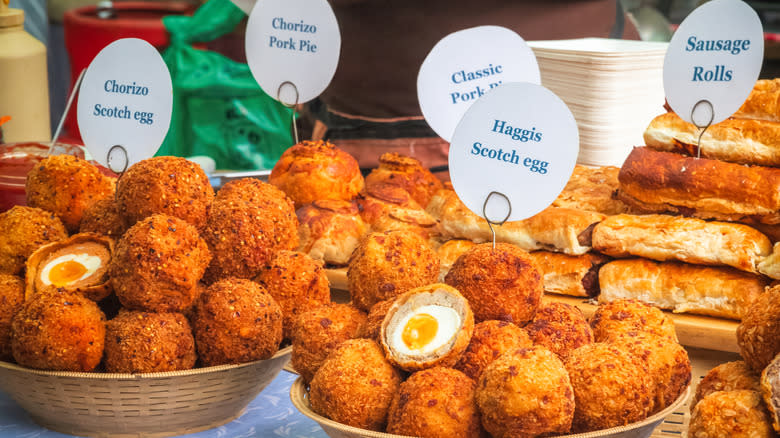
The Scotch egg is clearly a wonderful and versatile blueprint for experimenting with cooking. Whether you want to try to perfect the original recipe or invent something new like the Manchester egg, the possibilities are almost limitless.
For vegetarians, you can replace the sausage around the egg with a vegetarian haggis. You can even make it sweet by making the haggis with peanut butter and rolling it all in oats. You can also replace the chicken egg in the classic recipe with a quail egg, which is much smaller so you can make more and serve them as snacks or appetizers. There are a few ways to elevate the Scotch egg above its "pub food" reputation as well: the sausage can be replaced with venison for a heartier flavor, or minced lobster to turn the Scotch egg on its head and into a seafood dish. If you have the means and the creativity, the Scotch egg can be a canvas to explore. As long as you know the ultimate shape and preparation process for Scotch eggs, you can amend whatever you like however you like.
There's An Annual Scotch Egg Cooking Challenge
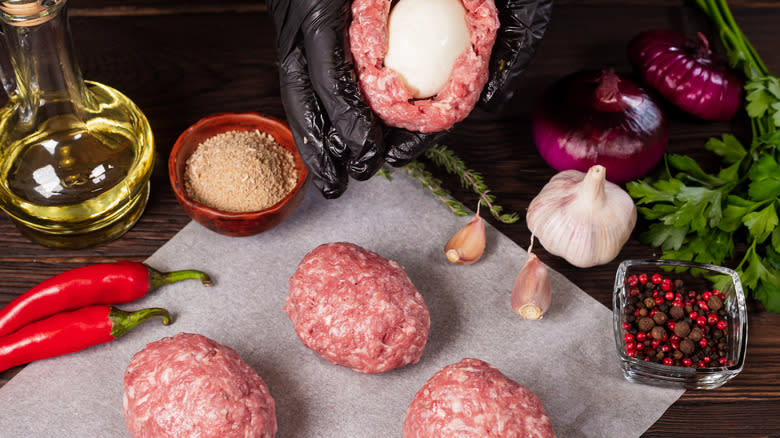
There are so many ways to cook a Scotch egg, and despite its widespread popularity, even the simplest version is difficult to master. This is why there's an annual Scotch egg cooking contest held in London each year.
The event is put on by Young's, a pub in Mayfair, London. It gathers chefs and food enthusiasts from all over London, most of them hailing from other popular pubs and restaurants. Some of the chefs work in fine dining, and some work in pubs, cooking up dishes like the Scotch egg all the time. In order to win, you need to juggle the look, taste, and texture of your Scotch egg in a way that can leave a real impression on some of the United Kingdom's most prominent food critics.
The Scotch eggs made for this contest are a mix of classic recipes and new, experimental modes. Does the hopeful chef go for the gold with a perfected take on what we already know? Or do they risk it all and attempt a new vision? Chef Oliver Marlowe from Chelsea pub and restaurant Hunter's Moon won 2022's contest with a fine dining twist on the Scotch egg. His "Golden egg" is made with brown egg at the center, truffle mayo, foie gras, and a gold leaf crumb crust.
The Queen Of England Had A Favorite Scotch Egg Recipe
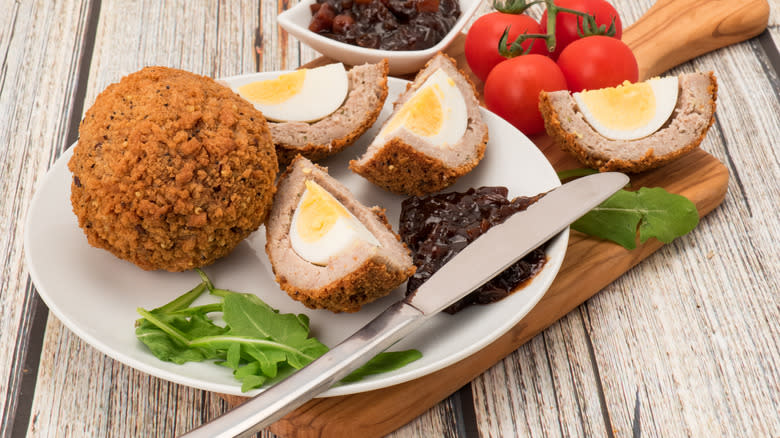
The Scotch egg is not just for the people in pubs and on picnics — the Queen herself had a favorite recipe for the English classic. It was revealed by Daren McGrady, a former royal chef, on his YouTube channel in 2021.
The Queen's chef would usually whip up his Scotch egg recipe for her garden parties at Buckingham Palace. We already know the classic recipe by now: a hardboiled egg blanketed in pork sausage, dipped in breadcrumbs, and deep-fried to a perfect crisp. McGrady, however, makes a slightly spicier version by making it with Thai curry paste, coriander, and a sweet chili sauce. These ingredients, which we can only assume are of the highest quality, are melded into the dish at each step of the process. The curry paste, coriander, and even peanuts are added to the sausage before it's cooked.
Once the egg is hardboiled, the sausage applied to the outside, and the breadcrumbs prepared, McGrady added the crispness by carefully deep-frying the egg in a pan or a fryer. After it's crisp, the Queen's Scotch egg is completed in the oven, where the meat and egg finish cooking before they're served in the royal gardens.
Timing Is Everything When Making Scotch Eggs
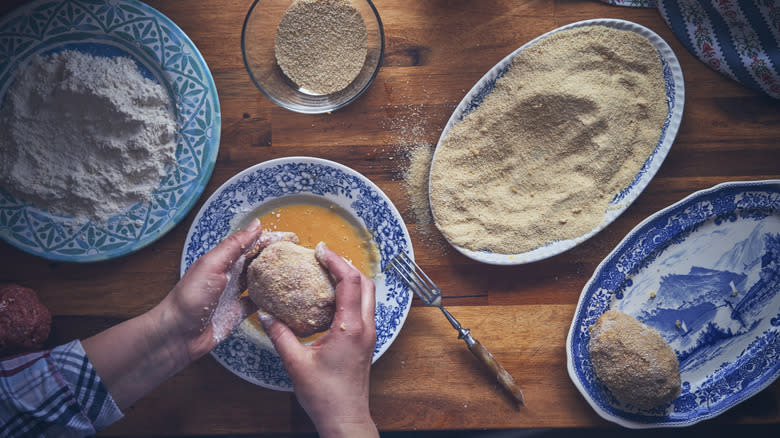
Timing the boiling and cooking of the Scotch egg is perhaps the most important step in the process. Consider this: the Scotch egg is an amalgam of three distinct foods or processes: the egg, the meat, and the frying (not considering any other special variation ingredients you might add). You'll want to make sure that your boil length is attuned to how you want the egg to feel and to also time it so that the egg finishes cooking as it's fried or put in the oven. The processes are like a nesting doll, with one inside the other, so that you have to consider the whole dish at once and cook it through, from beginning to end, in one fell swoop.
For example, the longer you cook the egg, the more solid the yolk becomes. You'll want to make sure (if you're cooking for others) that you know exactly what kind of texture you want before you start the process. For a good solid egg, you'll want to boil the egg for about 6 minutes before putting it into cold water to halt its cooking. This method is great if you're planning on eating the Scotch egg at a later time. A 4-minute boil will allow the egg to retain some of its liquidity if you're going to eat it immediately, not forgetting to let it cool once you pull it from the oven or fryer.
Read the original article on Tasting Table.

